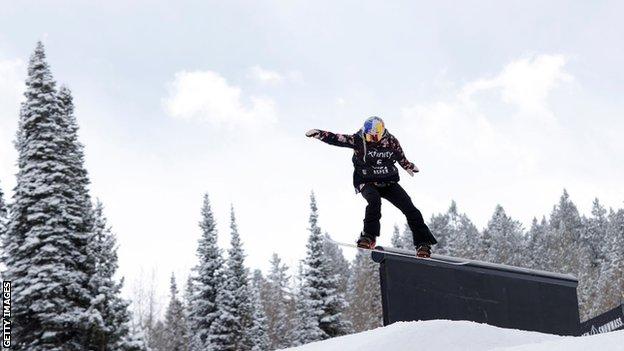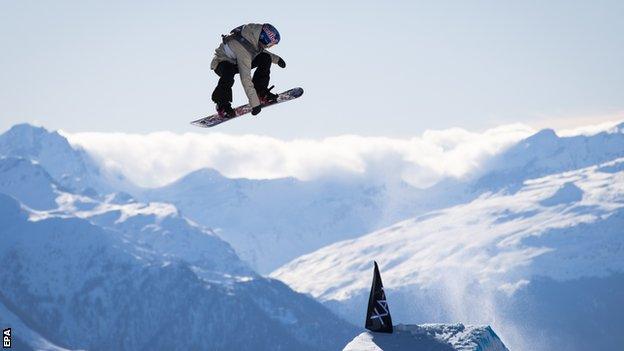Katie Ormerod: British snowboarder says Beijing 2022 Winter Olympics will be 'her time'
- Published

In 2020 Ormerod became the first British snowboarder to win the Crystal Globe - the overall World Cup title
Katie Ormerod is confident Beijing will be her Olympics. "I feel like this is my time," she says.
She has had to wait for it. The metaphorical pain of narrowly missing out on qualification for Sochi in 2014, followed by the literal agony of a broken heel, suffered in Pyeongchang in 2018, days before what should have been her Olympic debut.
But Beijing, she hopes, will be third time lucky.
"I've come back way stronger. I've had the most successful season of my career so far in between then and now, so I'm really in the best shape I've ever been in," the snowboarder tells BBC Sport. "I'm feeling nothing but positivity.
"I now feel like this is my time. I've done everything right, I'm snowboarding the best I've ever been snowboarding so all I can do is go there, have fun, do my best. I've put in all the hard work already so hopefully this will be my year."
Seven operations later, 24-year-old Ormerod calls all her previous injuries - of which there have been many - mere "paper cuts" compared with splitting her heel bone clean in two. Yet nearly four years on, and despite everything she has been through, her positivity is infectious.
Since her return to the slopes in 2019 she has bagged five podium finishes and in 2020 became the first British snowboarder to win the Crystal Globe - the overall World Cup title.
"I learnt quite a lot about myself from that injury. It was definitely not an easy injury to overcome, and I now know anything that life throws at me I can overcome it," she says.
"I'm really appreciative of every single moment I have on my snowboard now because I'm really fortunate that I love what I do, I love snowboarding, I love competing, and because of how bad the injury was and how long the rehab was, it just makes me make the most of every day on my snowboard.
"I feel really grateful that I have another opportunity to compete in an Olympics."

Ormerod will compete in the big air and slopestyle events in Beijing
And so to those Olympics. The Beijing Games begin on 4 February, 100 days from now.
Ormerod, the first female to land a double cork 1080 - three rotations and two inverted flips - will compete in the big air and slopestyle events, and has been nailing new tricks in training as the clock ticks down to the most important runs of her career.
One such trick is the 'Crippler', external, historically a halfpipe move but one which Ormerod has brought into her own repertoire.
"We're seeing a lot of halfpipe features being integrated into slopestyle courses now, so it's really important to actually start learning some halfpipe tricks because you just never know what the course is going to be like when you turn up," she says. "I want to make sure I'm turning up to Beijing as prepared as possible."
But as prepared as she might be, these Winter Games will be very different from those gone by.
Covid-19 still looms, meaning the Games will take place under heavy restrictions with the only fans watching set to be those from China's mainland. Ormerod is taking it all in her stride, though.
"Safety comes first, so you have to think of it like that. I'm hoping that I still will get the big Olympic experience, but right now I have no idea what that will look like," she says. "I'm sure it will be amazing no matter what.
"There will be some local crowds, which I think will be really nice having some people there supporting. I am obviously really gutted that my family can't come out to watch this one, so that is a shame, but I know that they will be supporting me no matter what.
"It's definitely been a different 18 months, but I'm just taking it as it comes, remaining positive and just doing everything that I can do.
"I hope it will be a Games to remember. I know we've got a really strong team going into it in both snowboarding and skiing, so it's going to be really exciting to see everyone compete and hopefully we can come away with some medals."

The 100 Billion Bottle Problem: Is Coca-Cola's pledge to tackle plastic waste on track?
Frankie Boyle's New World Order: The comedian's bold and outrageous way to make sense of the world we live in
